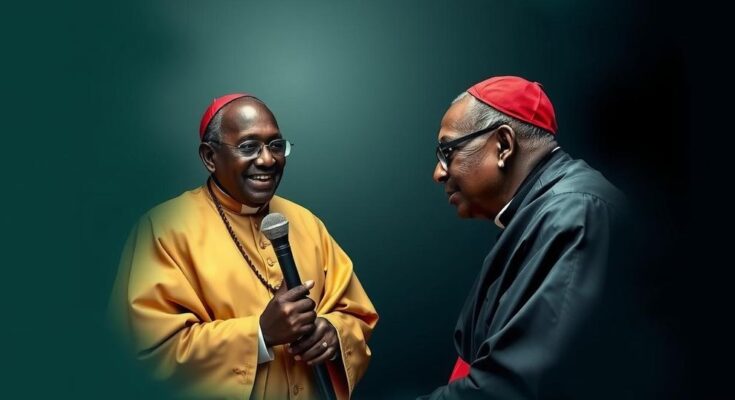Cardinal Stephen Ameyu Martin Mulla of South Sudan highlights the increasing problems faced by the country since independence from Sudan 14 years ago, pointing to political mismanagement and ongoing conflict. Despite hopes for peace, the nation continues to suffer from instability, humanitarian crises, and economic woes, exacerbated by the war in neighboring Sudan. The Cardinal suggests that collaborative efforts through the Synod on Synodality may provide pathways to resolving these issues and achieving lasting peace.
YAOUNDÉ, Cameroon – Cardinal Stephen Ameyu Martin Mulla, the prominent Catholic leader in South Sudan, has expressed his concerns regarding the worsening conditions in the country since it attained independence from Sudan 14 years ago. Although independence was initially seen as a beacon of hope, Cardinal Ameyu asserts that the reality has been quite different, with persistent issues of instability and mismanagement of natural resources exacerbating the situation. During his address at the Synod on Synodality in Rome, the Cardinal reflected on the initial aspirations for peace and freedom that independence promised. “We got this independence from Sudan. We thought that we were going to solve our problems. But it seems that problems have increased,” he stated, emphasizing the collective obstacles that the nation continues to face. He remarked on the initial war fought for liberation and the ongoing unresolved issues that linger within the political landscape of South Sudan, one of Africa’s most ethnically diverse countries with over 60 significant ethnic groups. Since its independence on July 9, 2011, which followed a peace agreement concluded in 2005 that ended Africa’s longest civil war, South Sudan has faced significant challenges. The country descended into civil war in 2013 due to political strife between President Salva Kiir and former Vice President Dr. Riek Machar, leading to prolonged violence and instability despite multiple attempts at peace agreements and cease-fires. Father John Gbemboyo, the Pastoral and Social Communication Coordinator for the Sudan Catholic Bishops’ Conference, added that this ongoing conflict has bred various opposing factions, resulting in severe human rights violations and humanitarian crises in the country. He described the dire economic conditions characterized by high inflation and prolonged delays in civil servant salaries, compounded by natural disasters, such as heavy rains and floods, that have devastated agricultural activities and infrastructure. A peace agreement reached in 2018 stipulated critical reforms and a general election set for December 2024, yet the implementation of its provisions remains inadequate, pushing the election date to December 2026 due to a lack of political commitment. Cardinal Ameyu lamented that continued instability, corruption, and mismanagement persist due to the leadership’s failure to uphold the revitalized peace agreement. He stated, “In South Sudan, we still have outlying issues of the revitalized peace agreement, which, in a way, the leadership in South Sudan is unable to implement to the letter.” Furthermore, the Cardinal voiced concerns about the situation in Sudan, which has seen violence since April 15, 2023, leading to thousands of deaths and millions displaced. He stated that war leaders have brought untold suffering to the civilians, leading to a humanitarian crisis affecting both South Sudan and its neighbor. Cardinal Ameyu expressed hope that the ongoing Synod on Synodality could provide avenues towards addressing these crises through dialogue, stating, “Synodality — going together — is for us the way to achieve peace.” He reiterated the need for cooperation and understanding among church and political leaders to help facilitate peace in both countries. Father Gbemboyo echoed these sentiments, remarking on the importance of the Synod on Synodality as a time for the global Church to invest in South Sudan. He stated that the initiative could aid in fostering unity and understanding amongst the diverse communities in the country, thus contributing to the peace-building efforts advocated by Pope Francis. Overall, the sentiments shared by Cardinal Ameyu and Father Gbemboyo highlight the profound challenges faced by South Sudan and Sudan, calling for increased collaboration among leaders and community stakeholders to foster a stable and peaceful future for both nations.
South Sudan gained its independence from Sudan on July 9, 2011, following a long history of conflict culminating in Africa’s longest civil war. The promise of peace was short-lived, as the nation soon fell into civil strife that has persisted for years, leading to a complex humanitarian crisis characterized by violence, displacement, and economic turmoil. Political instability has plagued the country since President Salva Kiir and former Vice President Riek Machar’s power struggle ignited conflict in 2013. State attempts to restore peace through various agreements have faced challenges in implementation, leaving the country to grapple with entrenched issues. The plight of South Sudan is further compounded by natural disasters and external conflicts, particularly the war in neighboring Sudan, which has displaced many and strained resources in the fragile South Sudanese economy. The leadership’s failure to heed the revitalized peace agreement has contributed to ongoing instability and suffering for the South Sudanese people.
In conclusion, the insights shared by Cardinal Stephen Ameyu Martin Mulla and Father John Gbemboyo reveal the significant challenges confronting South Sudan and Sudan. After 14 years of independence, South Sudan is still grappling with unresolved issues of governance, instability, and humanitarian crises, worsened by external conflicts and environmental disasters. The call for dialogue and the potential of the Synod on Synodality offer glimmers of hope, emphasizing the need for collaborative efforts toward rebuilding peace and stability in these nations. Without decisive action and genuine commitment from leadership, the aspirations for a peaceful resolution and the elevation of living conditions for the South Sudanese people may remain unfulfilled.
Original Source: cruxnow.com




